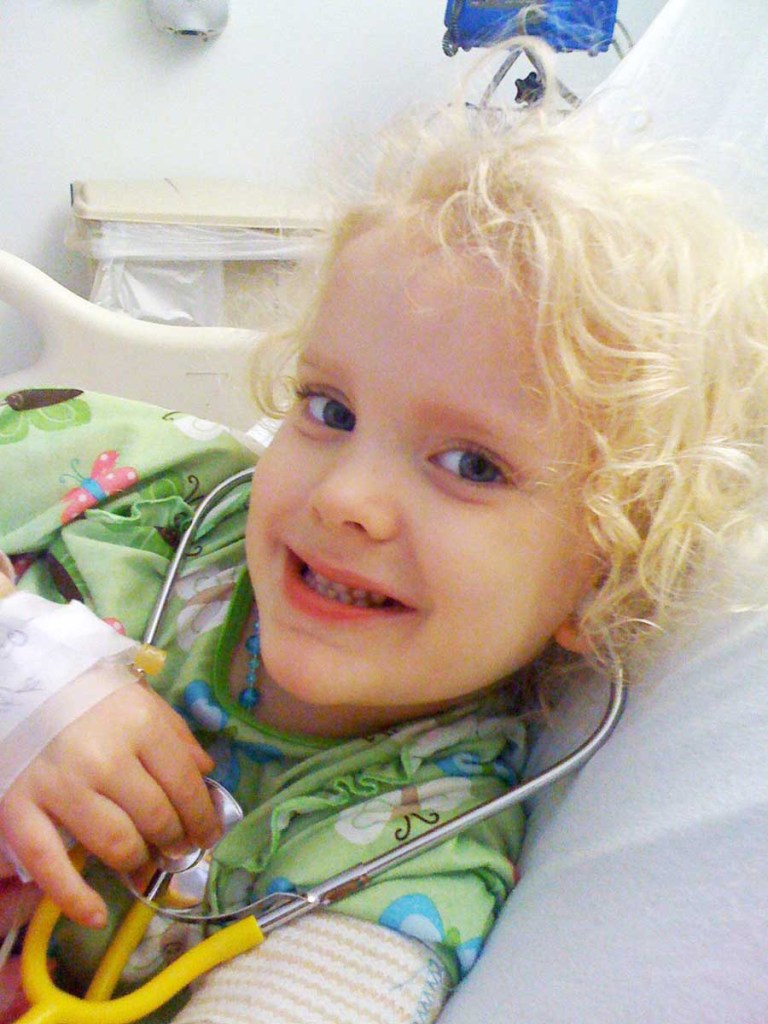Searching for a new normal
Published 2:04 pm Friday, March 25, 2011

- Maelee Sheehan is all smiles at the hospital.
Life has always been hectic but normal for Leann and Trent Sheehan of Cook Springs. With teenage children and four-year-old twins in tow, the couple has enjoyed watching their children grow.
Now, the family is struggling to find a new normal after 4-year-old Maelee was diagnosed with a rare blood disorder that no one can definitively diagnose.
Since last fall, the family has been in and out of clinics and hospitals trying to care for their child.
“On Sept. 9, we noticed she had lots of bruises on her legs. They were really bad, dark, ugly bruises,” said Leann Sheehan, Maelee’s mother. “We started seeing spots on her shoulders, which turned out to be petechie [minor hemorrhages from broken capillaries.]”
They went to the pediatrician for a blood test, which showed Maelee had a low blood platelet count.
From there, they were sent to Children’s Hospital, and after three weeks of tests, Maelee was diagnosed with aplastic anemia, an autoimmune disease which causes bone marrow to stop producing blood cells of any kind — red, white or platelets. Around 500 new cases of the disease occur in the United States each year, leaving it a largely unknown disease. However, recent strides have been made in treating the disease.
“Autoimmune disease treatment is still really new. Five years ago, doctors kept blood in these kids and just hoped they didn’t get infections,” Trent said.
Because Maelee doesn’t produce platelets, her blood is unable to clot properly, so bumps and scrapes that her twin sister Emmalee would br
ush off could put Maelee in the hospital.
“It’s really dangerous now, because if she hits her head, she could have bleeding in her brain,” Trent said.
Once a week, Maelee goes to the hospital to receive a transfusion of blood platelets, and once a month she receives red blood transfusion.
“She does pretty well [with the hospital visits]. She’s had five bone marrow aspirations, and when she gets low on her blood levels she gets bruising and bleeding,” Trent said. “She’s had two picc lines, and she has a port now, but she still likes to fight about it.”
On a day-to-day basis, their lives have changed. Trent recently quit his job to focus on pursuing his degree and taking care of his daughters. Maelee has to be more careful running around and playing, but she still enjoys spending time with her sister, who keeps a close eye on her.
“Emmalee is the caregiver, she’s mom when mom’s not around. She makes sure Maylee is OK. If she needs anything in the middle of the night, Emmalee is getting mom and dad,” Leann said.
“She’s always worrying about her sister,” Trent added.
With grandparents living closely, the entire family pitches in to make sure Maelee is taken care of.
“We have great support, but it’s a lot of waiting. No one can tell us what it is or how to fix it,” Leann said. “Since September, we’ve just dealt with not knowing and doing transfusions. Each doctor’s appointment, we’re always thinking ‘This will tell us what it is, and how we can move forward.’ But we’re always disappointed.”
Doctors recently found abnormal cells that they thought were indicative of Leukemia or Myelodysplastic Syndrome, but a recent biopsy dismissed those diseases, leaving more uncertainty and more testing for Maelee in the coming weeks — and more blood transfusions, despite the family’s dwindling supply of donors. Once a week, she receives blood plasma and once a month, she requires a transfusion of red blood.
Because Maelee is so young, she hasn’t had chicken pox, mononucleosis or herpes simplex, which carry Cytomegalovirus, or CMV. Her compromised immune system requires blood from donors who are also CMV negative, which can be hard to find, taking into account that between 50 and 80 percent of adults have been infected with the silent virus by age 40.
Anyone over the age of 16 is able to donate blood with a parent’s permission through the Red Cross’ many bloodmobiles in the area. By donating blood, interested donors can determine their blood type and their CMV status. Those who have B or O blood and are negative for CMV, directed donations can be set up to give blood directly to Maelee. The Red Cross allows donors to give red blood every 56 days and platelets can be donated every seven days.
“If people are interested in being regular donors, it would probably be every two weeks right now, but with more donors, it would be a longer amount of time between donations,” Leann said.
Other children in the St. Clair County area are also in need of other blood types, so donating to the Red Cross can also benefit many local families.
The Sheehans also encourage people to visit marrow.org and sign up to be a bone marrow donor.
To follow Maelee’s story or to contact the Sheehans about blood donation, visit maeleegrace.wordpress.com, or search for Facebook fan page, “Aplastic Anemia – Our New Normal.”





